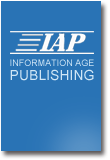
Women in Educational Leadership
Understanding Stress, Emotional Labor, and Resilience
Edited by:
Amy Sloan, Baylor University
Niccole A. Kopit, ECPI University
A volume in the series: Research on Stress and Coping in Education. Editor(s): Christopher J. McCarthy, University of Texas at Austin. Richard G. Lambert, University of North Carolina at Charlotte.
Call for Chapter Proposals
BOOK DESCRIPTION:Women in educational leadership face unique challenges within the education sector. This book will explore the intersection of women's stress, emotional labor, and coping mechanisms, shedding light on the structural factors and barriers that have contributed to the underrepresentation of women in educational leadership positions.
The book examines various educational settings, including traditional K-12, Remote K-12, Private K-12, and Higher Education, offering insights into the specific challenges and opportunities faced by women in each context. It addresses the impact of flexible work arrangements, which have become more prevalent in educational leadership, and explores the additional stress these arrangements can impose on women.
TOPICS OF INTEREST:
• The Gender Gap in Educational Leadership: Understanding the Barriers
• Stress and Emotional Labor: The Impact on Women in Educational Leadership
• Coping Strategies and Wellness Building for Women in Educational Leadership
• Case Studies and Best Practices from Successful Women Leaders
• The Role of Flexible Work Arrangements in Educational Leadership
• Addressing the Work-Life Balance Challenge: Strategies and Support Systems
• Future Trends and Recommendations for Advancing Women in Educational Leadership
• The Role of Emotional Labor and Resilience for Women in Educational Leadership
PROPOSAL SUBMISSIONS:
Proposals should include four parts: (1) a page with author name(s) and affiliation(s), email addresses, and a tentative title,), (2) a page with a brief biography (100 words) and relevant professional publications for each author, (3) an abstract (200-250 words), and (4) a summary of your completed study of up to 2,000 words, including introduction, methods, results, and discussion. Proposals should be sent as a single Word file to Niccole Kopit (nkopit@ecpi.edu) by April 1, 2024.
CHAPTER SUBMISSION GUIDELINES:
Authors of accepted proposals will be notified by April 15, 2024, about the status of their submission and sent chapter guidelines. Full chapters, ranging from 7,000 to 8,000 words in Times New Roman 12, double spaced text, inclusive of title, abstract, manuscript, and references, should be submitted as a Microsoft Word attachment by May 15, 2024. Manuscripts should conform to 7th edition APA style conventions. Graphics and images may be included. See Author Guidelines.
TENTATIVE SCHEDULE FOR PUBLICATION:
Early Proposal Submission: February 15, 2024
Final Proposal Submission Date: April 1, 2024
Notification of Invitation to Submit Chapter: April 30, 2024
Submission of Book Chapter: May 15, 2024
Reviews of Book Chapter Manuscripts Sent to Author(s): June 31, 2024
Receipt by Editors of Final Draft of Book Chapters: August 15, 2024
Final Book Submitted to Publisher: September 30, 2024
Anticipated Publication: December 1, 2024
Send inquiries to Amy Sloan — amy_sloan@baylor.edu and Niccole Kopit — nkopit@ecpi.edu
BUY ONLINE
- This title is in development and is not yet available to order online. Please call the IAP office for more information: 704.752.9125

CATEGORIES
CLASSIFICATION
RELATED TITLES
-
 Higher Education for the People
Critical Contemplative Methods of Liberatory Practice
Higher Education for the People
Critical Contemplative Methods of Liberatory Practice
-
 International Perspectives on Teacher Stress
International Perspectives on Teacher Stress
-
 Mindfulness for Educational Practice
A Path to Resilience for Challenging Work
Mindfulness for Educational Practice
A Path to Resilience for Challenging Work
-
 Personality, Stress, and Coping
Implications for Education
Personality, Stress, and Coping
Implications for Education
-
 Research on Teacher Stress
Implications for the COVID-19 Pandemic and Beyond
Research on Teacher Stress
Implications for the COVID-19 Pandemic and Beyond
-
 Stress and Coping of English Learners
Stress and Coping of English Learners
-
 Toward a Broader Understanding of Stress and Coping
Mixed Methods Approaches
Toward a Broader Understanding of Stress and Coping
Mixed Methods Approaches
